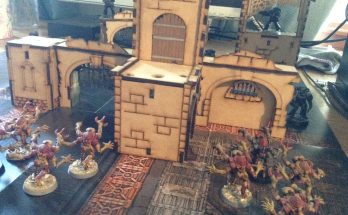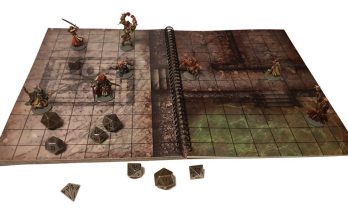Old School is a popular term around these parts, and needs no further introduction or explanation. But I’m wondering: Old School is Old School as opposed to……. what?
If Old School is dungeons, 10′ poles and killing monsters and taking their stuff, what’s New School?
And if the new New School is Old School, was there anything between New School and Old School (Middle School?) that marked the transition? Did Old School become old around the time of Spelljammer, or at a later point?
If you’re not playing Old School, what are you playing?
Enquiring minds want to know.




When I’m not playing old-school, then I’m using D&D 3.5 and adventure path stuff by Paizo.
Alex Schröders last blog post..Comments on SID Player for my iPhone
@Alex But what makes it different from Old School? :D
You, sir, are a semanticist! :)
Alex Schröders last blog post..Comments on Amazon Currency Converter
Wow, my last comment resulted in “Your comment is awaiting moderation.” — Apparently some code is trying to figure out whether I’m insulting anybody!
Alex Schröders last blog post..Comments on Amazon Currency Converter
Lol! There you go confusing WordPress with your big words :D
And you’re absolutely right. I’m intrigued by the semantics. If it’s not Old School – what is it? Definitions, please!
I think Old School is a term used to form a clique. The exact meaning doesn’t matter. Those who know the term and give you the nod are “in”, everybody else is out. That’s why a definition is meaningless. If you’re asking for a definition, you’re “out” — by definition!! :D
Wrestle with my semantics, fiend!
Alex Schröders last blog post..Comments on Amazon Currency Converter
Hey, more moderation!! I think there’s a definite anti-Alex bias in WordPress!
Alex Schröders last blog post..Comments on Amazon Currency Converter
I think Alex found something with his description :)
Other than that, to me “Old School” refers to how it used to be before the reform. Double duties as nostalgia inducing term referring to “the good old days”.
Eric Maziades last blog post..Prequelling Scepter Tower of Spellgard, part 2
The thing is, dungeons, killing monsters and 10′ poles are just as prevalent in D&D4e as in earlier editions (with the exception of the pole, I think) and I think we’d see some angry faces if we tried to tell some people 4e had anything in common with old school (it absolutely does, but that’s another topic!).
I have little to draw upon in terms of in-game old school experience besides old D&D and some of the games that use it as a base. So mechanicaly old school says to me:
– Modular rules that needn’t be consistent with a core mechanic
– Compact, number based character sheets where class mostly defines your progression
– The ability for luck to simply work against you and end your character’s life
– Mixed die-types and d100s, roll under or over.
These could each be good or bad depending on your personal preference. I know it’s a mix of both for me. But looking at newer games we have that move against those three points we’re left with “new school” having:
– A consistent core mechanic that’s used for as much of the system as possible
– Character sheets including things other than numbers, see Aspects and such.
– Mechanics that remove a lot of the risk of unwanted player death and more towards balance.
– A single die type, dice pools, counting successes, comparing rolls and passing around tokens or chips.
Again, these three are a mixed bunch for me, I find my preferences jump between both “schools” if such things even exist outside of clique forming. I’ll repeat my mantra of “good game design is good game design” and sit happily in my middle-ground :)
SuperSoogas last blog post..Swordmountain – Concept Brainstorming
WordPress is definitely having a mood today – it’s dropping everything into moderation. Find comfort in knowing it’s not just you, Alex!
@SuperSoogas I think you’re onto something with the idea the New School means consistent core mechanics. But Rolemaster (another of my all-time favourite systems) is very, very Old School. Yet it had incredibly unified mechanics – d100, roll high – and 10′ poles. Exceptions about, methinks.
More input needed! :D
What is new school? That is a good question. In my mind, the divide for new and old is that new school games, there has to be rule for everything and it usually has to be unified with the rest of the system. Ie there is no guess by the GM. Old school games tend to have more random character generation. No point buys, no I have character concept and I’m going to build that character. New School games tend to allow the player a lot of choices during character creation. I know that I use to be able to generate a 1st level anything in AD&D with equipment in less than 10 minutes. I don’t think I’ve been able to do that was any edition of D&D since.
Is there a clear cut date? No, but thinking on it, I would put it somewhere around when WOD stuff started to come out.
bonemasters last blog post..Maps may not be what you think they are.
To me Old School is not lite rules, but less of them. Also less of an devotion to “official” material. More GM control, and more focus on the player and less on their character.
New School is the opposite of this in every way.
Any game from any temporal era may be played in either way. It’s more about mechanics and presentation than style of play.
Dr. Checkmates last blog post..I’m an agent of chaos
Whether or not it is a valid semantic term, “Old School” is definitely a retroactive and reactive piece of terminology. The question, to me, is whether it is a preservative attempt, enshrining something previous for perpetuity, or a seperative attempt, defining another realm wherein certain individuals can exist away from something they don’t like.
I was going to say that New School’s defining trait was mechanics for roleplaying, instead of roleplaying being something you never needed rules to support in Old School. Then I realised that losing a level for failing to adhere to one’s chosen alignment was a rather old rule, dating at least back to the time when games came in boxes. Though alignment was (and still is, to some extent) much maligned, and was the first thing a would-be designer ditched, it was some mechanical support for how your character acted.
Chronologically, Spelljammer is a good dividing point, on one side or the other. The argument for Old School being everything before is that outer space is pretty much as far from the dungeon as you can get, in linear distance as well as tropes.
The argument for the line being afterwards–for me at least–was that Planescape was the next big setting five years later. Planescape’s cosmology was from first edition, and hadn’t been mentioned in 2nd ed prior to this. I recall someone at the time saying, “Look, they brought the Cosmic Wheel back. How Old School. Next they’ll bring back half-orcs.”
Golgotha, I think you’re right; for me, new-school is about the crunch and old-school is about the fluff. Of course, this is a very loose definition and is more about the style of play, but the style of play you use can extend from the rulebooks themselves.
The Recursion Kings last blog post..Combining miniatures and roleplay
I’m wondering… if you’re (optionally) young and (required) never had any experience with RPGs, you’re always awkward with the rules the first few (many?) sessions.
Wouldn’t this push the game more towards fluff than towards crunch, when trying to play?
I remember the unwieldy 2nd edition rules – ever time we had trouble deciding how to apply the rule, we always ruled based on our perceived intent of the rule. Call this “fluff” or “rule of cool”.
As we played, we got more accustomed to rules and some players went towards rules bending, min-maxing and rules lawyering.
I wonder if this ain’t part of “old” vs “new” in terms of potential evolution of game play.
Eric Maziades last blog post..Prequelling Scepter Tower of Spellgard, part 2
Loving the input so far – certainly food for thought. Keep it coming, folks!
@Eric Good point about the fluff and crunch. I’d suggest that New School is more concerned with the mechanics (ie, the crunch) at the expense of the fluff, whereas old-school we just took a cool idea and ran with it. New School mechanics tend to control the action more tightly.
Old School is like Classic Rock, it’s all the members of a set belonging to a certain (fuzzy) period. You can then look at that sub-set to try to identify common features, but the presence or absence of those features doesn’t make something a member. Traveller is Old School, but it was set in space; Rolemaster is Old School, but it had a unified mechanic; Runequest is Old School, but it had no classes, etc. On the flip side, Encounter Critical is set up to have many of the features that were common to Old School RPGs, but it’s not Old School…it’s Retro.
New School (or should that be New Wave?) isn’t just the set of all RPGs that aren’t members of the Old School RPGs, but IMO the games that deliberately set themselves up in opposition to the Old School, rather than as extensions or refinements. GURPS, Ars Magica, Shadowrun, Vampire: The Masquerade…possibly not the earliest examples, but the ones that spring to mind.
Joshuas last blog post..Keep Your Filthy Narrative Out of My Roleplaying
Thats a very good point too. Giving it some more thought, it might be also that old school games *tend* to be easier to pick up than the rules heavy trend in newer RPG’s (personally, I still run a ranger as a fighter who lives in the wild and dislike the idea of having to have a class for that with its own set of skills and rules, but that’s more of a mindset thing). I recently went through the second edition AD&D combat and tactics book to convert bits to labyrinth lord and was astonished at how needlessly unwieldy some of the rules are in it, but perhaps thats a topic for a blog post by itself.
The Recursion Kings last blog post..Combining miniatures and roleplay
@Recursion King:
If “old” and “new” are relative to when you started playing then, for me, “old school” is needlessly complex.
I never played the original – I started with ADnD 2nd edition. Every edition since then simplified the rules.
To me “new school” seems to be simpler than “old school”.
Seriously, try explaining THAC0 to a girlfriend who has passive interests in maths or geekery :P
Eric Maziades last blog post..Prequelling Scepter Tower of Spellgard, part 2
@Eric I’d say that 2nd edition AD&D was where D&D as a whole peaked in terms of confusing complexity. That was the age of awesome settings but terrible rules. The gameworlds and sheer sense of wonder and imagination from those days makes it Old School – GMs had to wing things because the rules didn’t make sense! :D
@Joshua Excellent musical comparison, and thoughtworthy comment about systems such as Shadowrun and Vampire making a conscious effort to move away from the Old School gamestyle. Kudos to you.
New School is dragons having a class, New school is orcs doing good things, New school is dungeon punk. New School is kewl powers and the Massively Multiplayer Online Roll Player Game style of 4e. New school is not designed for Roleplayers, but for kids that play World of Warcraft (yeah, if I want to play 4e, I play World of Warcraft).
Old School is roleplaying, designing your own adventures, and having no boundries in designing your character your way. Old school is playing 18 year old farm boys who go explore the caves and nicely crafted ruins outside your town looking for treasure and danger.
Eltons last blog post..Classic Dungeons and Dragons and Rolemaster